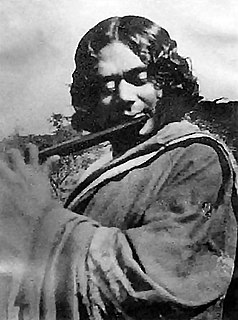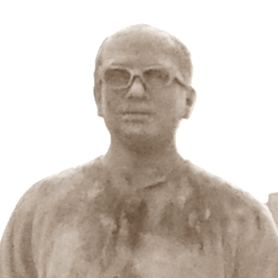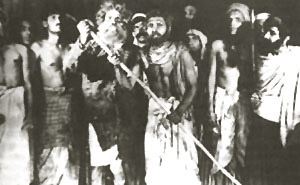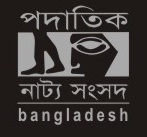Related Research Articles
The music of Bangladesh spans a wide variety of styles. Bangladesh claims some of the most renowned singers, composers and producers in Asia. Music has served the purpose of documenting the lives of the people and was widely patronized by the rulers. It comprises a long tradition of religious and regular song-writing over a period of almost a millennium.

Kazi Nazrul Islam was a Bengali poet, writer, musician, and is the national poet of Bangladesh. Nazrul is regarded as one of the greatest poets in Bengali literature. Popularly known as Nazrul, he produced a large body of poetry, music, messages, novels, stories, etc. with themes that included equality, justice, anti-imperialism, humanity, rebellion against oppression and religious devotion. Nazrul's activism for political and social justice as well as writing a poem titled as "Bidrohi", meaning "the rebel" in Bengali, earned him the title of "Bidrohi Kobi". His compositions form the avant-garde music genre of Nazrul Geeti.

Syed Nazrul Islam was a Bangladeshi politician and a senior leader of the Awami League. During the Bangladesh Liberation War, he was declared as the Vice President of Bangladesh by the Provisional Government. He served as the Acting President in the absence of Sheikh Mujibur Rahman.
Rabindra Nritya Natya is the group of four dance-dramas composed by Bengal's Nobel laureate Rabindranath Tagore: Chitrangada, Chandalika, Shyama and Shrabangatha. The principal characteristic of these works is that the story is told entirely through dance and song. The dances included in them were in the dance form created by Tagore. Tagore also included dance in earlier works such as Tasher Desh, though these are not regarded as Rabindra Nritya Natya.

The music of West Bengal includes multiple indigenous musical genres such as Baul, Ramprasadi, Bishnupuri Classical, Kirtan, Shyama Sangeet, Rabindra Sangeet, Nazrul Geeti, Dwijendrageeti, Prabhat Samgiita, Agamani-Vijaya, Patua Sangeet, Gambhira, Bhatiali, Bhawaiya, Bengali Rock.

Zainul Abedin was a Bangladeshi painter born in Kishoregonj, Mymensingh Bangladesh. He became well known in 1944 through his series of paintings depicting some of the great famines in Bengal during its British colonial period. After the Partition of Indian subcontinent he moved to East Pakistan. In 1948, he helped to establish the Institute of Arts and Crafts at University of Dhaka. The Indian Express has described him as a legendary Bangladeshi painter. Like many of his contemporaries, his paintings on the Bengal famine of 1943 are viewed as his most characteristic works. His homeland honored him with given the title "Shilpacharya" "Great teacher of the arts" for his artistic and visionary attributes. He was the pioneer of the modern art movement that took place in Bangladesh and was rightly considered by Syed Manzoorul Islam as the founding father of Bangladeshi modern arts, soon after Bangladesh earned the status of an independent republic.

Mymensingh is a major city and the capital of Mymensingh Division, Bangladesh. Located on the bank of Brahmaputra River, about 120 km (75 mi) north from Dhaka, it is a major financial center and educational hub of north-central Bangladesh. The city was constituted on 1 May,1787 by the British East India Company.

Bengali theatre primarily refers to theatre performed in the Bengali language. Bengali theatre is produced mainly in West Bengal, and in Bangladesh. The term may also refer to some Hindi theatres which are accepted by the Bengali people.

Ekushey Padak is the second highest civilian award in Bangladesh, introduced in memory of the martyrs of the Bengali Language Movement of 1952. The award is given to recognize contributions in a number of fields, including culture, education, and economics. The Ministry of Cultural Affairs administers the award.

The culture of Bengal defines the cultural heritage of the Bengali people native to eastern regions of the Indian subcontinent, mainly what is today Bangladesh and the Indian states of West Bengal and Tripura, where the Bengali language is the official and primary language. Bengal has a recorded history of 1,400 years. The Bengali people are its dominant ethnolinguistic group. The region has been a historical melting point, blending indigenous traditions with cosmopolitan influences from pan-Indian subcontinental empires. Bengal was considered to be the richest part of Islamic medieval India and during the era of the Bengal Sultanate it was described to be a major trading nation in the world, while during Mughal times, having triggered the proto-industrialization, its economy was worth 12% of global GDP. However, significant socio-economic inequalities existed during this period. As a part of the Bengal Presidency, it also hosted the region's most advanced political and cultural centers during British rule. Historically Feudalism has been widespread in the entire eastern Indian region. The feudal system flourished to a large extent under the British administration, which served as a means to exploit the Indian peasants by the British colonizers. This created a class of rich landlords in Bengal and a large population of poor peasants. It is noteworthy that a major portion of the Bengali intellectual community during the British era emerged from this wealthy class of landlords, as primarily they belonged to well educated families and got the economic opportunities to receive English education, often from abroad. The lower social classes remained in abject poverty and illiteracy. Thus, although the contribution of the Bengali intellectual community has been immense towards literature, science, politics and the Indian freedom movement, but still as it flourished under an exploitative imperial government, it mostly constituted of individuals belonging to the wealthy landlord families.

Jatiya Kabi Kazi Nazrul Islam University is a government financed public university of Bangladesh. It is also known as JKKNIU. It is located at Nama para Battala, 2 kilometres West from Trishal Bus stand, some 22 kilometres from Mymensingh district and 100 kilometres from Dhaka.It is the first general university established in Mymensingh division. The university was established in 2006. At present more than eight thousand students are studying in the university.

Chashi Nazrul Islam was a Bangladeshi film director and producer. He won Bangladesh National Film Award for Best Director twice for the films Shuvoda (1986) and Hangor Nodi Grenade (1997). He was awarded Ekushey Padak in 2004 by the Government of Bangladesh.
Aneek, established on 09 October 1999, is a group theatre based in Kolkata, India. Aneek celebrates its Silver Jubilee this year.

Padatik Natya Sangsad is a Dhaka based Bangladeshi Bengali theatre group. To sustain the spirit of the Bangladesh Liberation War, the group was formed in 1978.
Abdul Hye Sikder is a Bangladeshi poet. He is a former executive director of Nazrul Institute and vice president of Jatiya Nazrul Samaj. He received the Bangla Academy Literary Award in 2003.

Tamalika Karmakar is a Bangladeshi actress and model. Her notable film roles were in Ei Ghar Ei Songshar (1996), Kittonkhola (2000) and Ghetuputra Komola (2012). Tamalika won Bangladesh National Film Award for Best Supporting Actress for her role in Kittonkhola. In July 2017, she performed, with Aranyak Nattaydal theatre troupe, in Rarang, on their 180th rendition.
Sunil Kumar Dhar was a Bangladeshi classical musician.

The Nazrul Institute is Bangladesh's national institute, established in February 1985. Its headquarters are located in Kabi Bhaban in Dhanmondi, Dhaka, Bangladesh. It fulfills a number of roles; promoting the literary work of the poet Kazi Nazrul Islam, recognising excellence in literature research by conferring awards, and public engagement.

Bazlur Rahman Badal was a Bangladeshi dancer. He was awarded Shilpakala Padak in 2014 and Independence Day Award in 2017 in the dance category by the Government of Bangladesh.
Sharmila Banerjee is a classical, folk and creative dancer and choreographer from Bangladesh..
References
- ↑ "Bahurupi Natya Sangstha". Bangladesh Group Theatre Federation. Archived from the original on 12 January 2013. Retrieved 16 October 2012.
- ↑ Islam, Aminul (3 August 2015). "Bahurupi stages Tagore's Chitrangada". The Daily Star. Retrieved 30 June 2020.
- ↑ "Bahurupi Natya Sangstha stages". The Daily Star. 9 December 2011. Retrieved 16 October 2012.
- ↑ "National Street Theatre Festival in Mymensingh". The Daily Star. Retrieved 16 October 2012.
- ↑ "A dance drama on Nazrul staged in Mymensingh". The Financial Express. Dhaka. 7 December 2015. Retrieved 1 February 2016.
- ↑ "Theatre Festival begins in Mymensingh". The Daily Star. 25 June 2012. Retrieved 16 October 2012.
- ↑ "Bahurupi Natya Sangstha's Homage to Language Martyrs". The Daily Star. 25 February 2011. Retrieved 16 October 2012.
- ↑ "'Shyama' staged in Mymensingh". The Daily Star. Retrieved 16 October 2012.
